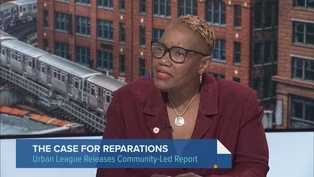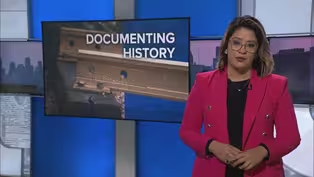Chicago Tonight: Black Voices
New Opera Explores Black Family's Grief, Journey Toward Healing
Clip: 11/13/2024 | 8m 29sVideo has Closed Captions
"Blue" follows a family grappling with grief after they lose their son to police violence.
A new production at Lyric Opera follows a Black family grappling with grief after they lose their son to police violence, all while the father serves as a police officer.
Problems playing video? | Closed Captioning Feedback
Problems playing video? | Closed Captioning Feedback
Chicago Tonight: Black Voices is a local public television program presented by WTTW
Chicago Tonight: Black Voices
New Opera Explores Black Family's Grief, Journey Toward Healing
Clip: 11/13/2024 | 8m 29sVideo has Closed Captions
A new production at Lyric Opera follows a Black family grappling with grief after they lose their son to police violence, all while the father serves as a police officer.
Problems playing video? | Closed Captioning Feedback
How to Watch Chicago Tonight: Black Voices
Chicago Tonight: Black Voices is available to stream on pbs.org and the free PBS App, available on iPhone, Apple TV, Android TV, Android smartphones, Amazon Fire TV, Amazon Fire Tablet, Roku, Samsung Smart TV, and Vizio.
Providing Support for PBS.org
Learn Moreabout PBS online sponsorshipthe sites remain on private property.
And a new production at the Lyric Opera follows a black family grappling with grief after they lose their son to police violence.
All while a father serves as a police officer, the opera is called Blue and the characters are all nameless in just referred to his father, father, mother and son.
The production explores injustice and finding healing through faith and community.
Hear from the cast are Kenneth Kellogg who plays the character known as father and Zoe Reams, a Chicago native who plays the mother character.
Thank you both for joining us.
I want to start Zoe.
The show is incredibly unique because we don't often see black full focus opera in that often.
How do you think the medium per helps shape the story?
think that being something on stage, it elevates what you can talk about elevates a story.
>> To the point where maybe you're able to remove yourself a little bit from it.
But at the same time, able to talk about things that you might not bring up in passing with someone or on the street or at a dinner table.
It might be awkward.
It might be too uncomfortable.
It may be too difficult.
And I think stage in general, especially after which is a medium that has pretty much everything you have music you have singing.
You have acting stage, directing lights.
will not so much camera but everything except amplification, which I think also gives a natural connection to the human voice.
I think it's a perfect way to amplify those stories and have more difficult conversations like this show.
Does we buy a case?
What are your thoughts?
tenant, Kenneth I think arts is that space to have these conversations, you know, opera.
>> It's heightened emotion.
You're living emotions at their highest level.
When you come to the opera.
And these are often stories you don't get to hear about and their stories that are put to the side.
So to put this story on the stage with the ability to enhance that emotion and expressing display emotions of the community that normally don't get heard.
really powerful in this piece week and talking about the you play the father who is also a police officer.
now being a black cop is an identity that comes with a lot of baggage.
>> Given you know what?
But from people's relationship with the criminal justice system is how difficult was it to showcase that duality for you?
>> It was it was difficult in the sense that I didn't know what it meant to be.
A police officer didn't know how it felt.
You know why someone who looks like me would choose to be a police officer being a father.
I knew I could easily dive in to that.
Tazewell.
The director had the brilliant idea me meeting with actual police officer was black.
So it was Frank and he consulted unit as well and developing the peace.
So I asked for things like why as a black man, why choose to be a police officer?
And his answer had nothing to do with division.
It was all about humanity and wanting to help better.
His community and everything team after that.
But he's intentions were pure.
It was too to help and to help his community and his neighborhood be better.
She had perspective.
Absolutely.
Absolutely.
And I found my way and through that, I don't.
Imagine.
Imagine, you know, being a police officer came certain level knowing and want.
It didn't come with the negativity.
I don't think that's a choice anyone would make going policing and not being a police officer could really even dive into that.
But getting to know a black police officer personally and understand his personal story, I was able to find the humanity and the choice that really interesting.
And so there's a scene in the show with the mother tells a group of women what her husband Let's watch that.
>> You may caught in >> And so putting yourself in those shoes and the wife shoes.
Why do you think that that a vote, that kind of response from this group of women?
Yeah, I mean, I think.
>> Unfortunately, our community knows too well about the horrors of what can happen to a community into a family when faced with something like what you might think is, you know, just being pulled over or, you know, just being stopped for something could and terribly.
We've seen it all too many times.
So I think in that moment just really hard for the friends to grasp why put herself willingly in that situation.
The next part after that, though, is this beautiful aria, that the mother sayings about how how she's loved by this man.
And I think that is super important, too.
The dichotomy of it's not perfect.
But I know this man loves me and for black love to be on stage.
I think that's so beautiful.
It's it is, you know.
It's hard to address a lot of the things that happen in our community because they are so heavy.
But I love that.
That dichotomy of I'm with this man because I love him.
And he loves me truly deeply unconditionally.
This beautiful to see now as explorers, many different concepts and things that people go through.
when we see the sign a position with the father arguing about how to properly present yourself, what are those 2 characters meant to tell us about, you know, how they come across?
I think that division between the father and the son.
I think it's generational.
The father comes from a generation of, you know, follow.
>> The law do things in the correct way.
Whatever the correct way is and you'll be safe in the world.
And it's been proven and we see that doing the right thing isn't always the And the song is from the generation of and I have do something say something for the system to change.
I don't do it and things won't change.
So I think there is that budding of had heads of generations.
And then that scene, it's a beautiful, beautiful cloud.
It seems like they're looking to different experience.
Absolutely.
Absolutely.
We are generation.
We are.
I mean, the first thing you often hear when no black body has been killed why didn't they do something like justification for there are murder or them being taken.
No matter what would lose your life should not be not be the result.
>> So your Chicago native, yes, you know, what does it mean to, you know, act in your hometown to be part of show.
Yeah.
We got like 50 people coming us.
Well, that's great.
I think it's important that.
I'm just happy that people are going to be able to see this people that look like us, people that look like the people that are on stage.
>> It's just a really cool And I hope for more opportunities like that to calm as as often as they can.
It's just going to be a special night for for my friends, family and community to be in the audience.
That's really great.
And Kenneth, want to go to you just piggyback what you said, opera, something that >> many people think as an upper class of people in blue is telling a very contemporary story that's felt by all classes of people.
How has blue change, what's possible in >> Yeah, I think blue is special in that.
And one of the things you mentioned earlier was about, you know, the characters not having needs.
I think Blue tells a universal story of love and loss.
A family.
And this just happens to be a black family in Harlem.
But those universal ideas being in love and having a child and that joy and beauty in that and losing someone to tragedy.
Those or universal stores.
But in specifically we're talking about this black family it's a story that I think people really attached because the awareness of what's going in society.
And it's it's on our and the front of our hearts and minds right credit can lead to CNN Open the opening.
Is this week rate.
Yes, one what does or until?
South Side Residents Take Part in a Study on Reparations
Video has Closed Captions
Clip: 11/13/2024 | 8m 9s | A new report focuses on 10 Chicago neighborhoods, seeking people's thoughts on reparations. (8m 9s)
Task Force Releases Findings on Illinois' Role in Underground Railroad
Video has Closed Captions
Clip: 11/13/2024 | 2m 29s | There could be at least 200 sites in Illinois that are part of the network. (2m 29s)
Providing Support for PBS.org
Learn Moreabout PBS online sponsorship
- News and Public Affairs

Top journalists deliver compelling original analysis of the hour's headlines.

- News and Public Affairs

FRONTLINE is investigative journalism that questions, explains and changes our world.












Support for PBS provided by:
Chicago Tonight: Black Voices is a local public television program presented by WTTW

